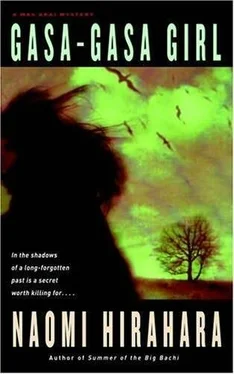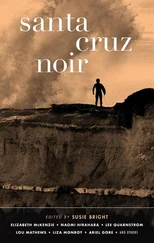“So you’re the father?” Worm looked through round-framed glasses at Mas. They sat on opposite sides of Worm’s metal desk, surrounded by stacks of white papers, manila folders, and brown accordion file holders.
Although it had cooled to fifty degrees outside, the one-room office was hot and suffocating. The walls were covered in wood paneling; the floors, linoleum. A space heater two feet away glowed with coils of bright orange.
Mas felt sweat drip into his ears. He had already taken off his jacket and wanted to do the same with his sweater. He wouldn’t dare to get half-naked in front of Worm Lewis, however.
“Yah, Izu Mas Arai.”
“Where you from?”
“ California,” said Mas. “ Altadena. Whatsu dis gotta-”
“Listen, you want to post bail, I need information.” The unlit cigar remained in Worm’s thick lips.
Mas smoothed out a piece of paper that he had folded up into his pocket. “Dis all information I have.”
Worm began typing on a keyboard connected to a computer that seemed to have seen better days. Red duct tape held together its rectangular hard-drive case.
“Hmm, first-degree murder, this is a bad one. So what happened?”
Why do I have to give play-by-play? Mas wondered. He was too afraid to question the bail bondsman. This was Worm’s world, not his, and Worm had the key to set Mari free.
“Dis guy Kazzy Ouchi shot dead. Last Thursday.”
“Kazzy, what kind of name is that?”
Well, what was Worm? thought Mas, practically biting his tongue. “Kazuhiko heezu full name, I think. Anyhowsu, American. Born here.” Like me, Mas added silently.
“So what connection did he have with your daughter?”
“My son-in-law’s boss.”
Worm shifted his cigar to the other side of his mouth. The cigar was half-chewed, and Mas wondered if he had had it in his mouth all day. “Some kind of love connection?”
Mas felt his mouth go dry. “Heezu old man. Older than me.”
“Happens all the time. I’ve seen it all, you know.” Worm typed Mas’s residence into his computer. “How much equity do you have in the house?”
“Paid off,” Mas said.
Worm printed out some paper and pointed to sections where Mas had to sign. “Now, you realize if your daughter hightails it out of here, you’ll have to forfeit the house, right? We’ll take a hundred thousand from the sale.”
Mas closed his eyes. The McNally house, the small ranch-style home. Two bedrooms. One bath. Porch with a Japanese pine and rocks in the front. The only house he had ever owned.
Mas opened his eyes and stared into Worm’s round face and noticed a large wart on the side of his left nostril. “Yah, I understand.”
“So, I’m going to need ten percent. That’s our fee.”
Even though Lloyd had told him to be prepared, it was still a shock to hear it. Worm stapled a set of papers together. “Ten thousand dollars,” he said. “Cash, credit card, or some kind of loan agreement through us.”
Mas looked at stickers of different credit card companies stuck to the side of the desk. Visa, MasterCard, American Express. Even a credit card from Japan.
Mas pulled out his new credit card, never been used. How was it that he had come to New York City with a fifteen-thousand-dollar line of credit and a paid-off house and a few days later was ten thousand dollars in the hole and in danger of losing his home? This is a sacrifice for Mari, he told himself. This is for my daughter.
***
Mas was making salami sandwiches when Lloyd and Mari finally came home. He had picked Takeo up from the neighbor’s place, and the baby was fast asleep. Before peppering them with questions, he gave them a chance to see Takeo and change out of their dirty clothes.
Mari was the first to emerge from the bedroom. “Thanks for putting up the house,” said Mari.
“Jail pretty bad?” Mas had gone to visit someone at a jail in L.A. for the first time last year and hadn’t relished the experience.
“We don’t need to talk about it right now.” She picked up one of the salami sandwiches and ate it musha-musha, as if it were the best thing next to pickled mackerel sushi.
The phone rang and Mari answered, with a ball of salami sandwich bunched up in her left cheek. She stopped chewing and asked a few questions. Her dark eyebrows furrowed like a wire spring pressed together too tight.
“That was Anna Grady,” she said, getting off the phone. “Seiko is dead.”

Mas had been truly afraid only three times. The first time was, of course, when he stood in the black rain of the Bomb; the second, watching Chizuko being eaten by the cancer; and the third, when the Bomb returned from its hiding place in his memory. In those instances, fear slapped him square in the face and kept his legs from moving. The tangle of Kazzy’s murder was different. Here now fear slowly seeped in, causing him to run faster and faster. Hayaku, hayaku, just like the pace of the city.
He was now in Fort Lee on the thoroughfare by the bus stop in the plaza, passing familiar cafés with lit candles on the tables.
Anna Grady said that she wanted to talk to Mari, face-to-face, but there was no way Mari could risk bail by leaving New York City. Lloyd was ready to go. News of Seiko Sumi’s death had altered his thinking. Lloyd had said he thought that the run-in with the Impala in Seabrook was more a case of road rage than anything else. Apparently Mari had gotten in her share of shouting matches and short-term chases when she was behind the wheel of a vehicle. But now, with another dead Nisei, you couldn’t help but make certain connections.
But Mas told Lloyd to stay home. If Anna had taken a fancy to Kazzy, a half-Japanese man, maybe she would open up to Mas.
It was no problem locating the exact high-rise building. Three police cars, lights flashing, were parked at the loading zone, radios squawking out numbers and addresses over the crackle of static. In spite of the late hour-nine, ten?-there was a small crowd of men and women surrounding the parking lot, cordoned off by familiar yellow police tape. Huge lights had been propped up, as if it were a location for a movie shoot. Mas knew about these things because he had driven past his share of production sites in L.A.; hell, one director had paid him one hundred dollars to park his Ford gardening truck in the background of a scene.
The figure of a body was outlined on the concrete ground. The coroner’s department must have carted away the body, but had left behind a puddle of blood. Under the bright lights, the blood glistened, still wet with floating chunks of body parts-was that part of a brain? Mas felt his dinner come to his throat, but he pushed it down.
He couldn’t believe that only this remained of the chawan -haired woman so prim and precise.
The same security guard was outside with the crowd, so in spite of the high-rise being the scene of a bloody death, Mas found it easier to get to the elevator, and then to Anna Grady’s floor. The apartment door was open, more radio voices. A long, colorful ribbon decorated the knocker. Mas hadn’t noticed that before.
Police officers, men in suits and ties, and women in sweaters and slacks walked into and out of rooms, talking among themselves and taking notes. Again, no one seemed to pay attention to Mas.
The sliding-glass door was ajar, letting a cool breeze in. Mas could smell the sourness of an overworked river. A wind chime shaped like a Buddhist bell tinkled from the top of the balcony. Most of the plants had been overturned, soil dumped out, roots exposed.
“Mr. Arai, you came.”
Mas turned. Anna Grady was wearing a tight black dress with part of her chichi s showing. At her age, her breasts should have drooped down to her heso, belly button, so either she had on one amazing piece of underwear or else her body was still in tip-top shape. “Please, over here-” She gestured to a small dining room table in the corner.
Читать дальше













